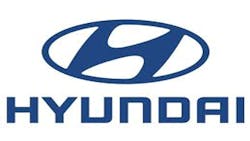Hyundai Motor Saw 12% Profit Rise for 2012
SEOUL --Despite the twin challenges of a strengthening won and a global downturn that sapped demand, Hyundai Motor Co. (IW 1000/54) reported a 12% increase in net profit for 2012.
Consolidated net profit was 9.05 trillion won (US$8.4 billion) last year, compared with 8.1 trillion won in 2011, the country's top automaker said in a statement.
Operating profit reached an annual record of 8.4 trillion won, up 5.1% from a year ago. Sales rose 8.6% to also reach an annual record of 84.4 trillion won.
"Sluggish domestic sales that lasted through last year, the won's strength and the yen's weakness put pressure on the quarterly results," the statement said.
The company saw its fourth-quarter net profit fall 5.5% from a year ago to reach 1.8 trillion won. Operating profit for the October-December period also tumbled 11.7% to 1.8 trillion won.
Hyundai, together with its smaller affiliate Kia, is the world's fifth-largest automaker.
The Seoul-based auto giant sold 4.4 million cars worldwide in 2012, up 7% from 2011, and said Thursday it planned to sell 4.6 million cars this year.
Sales in China, the world's top auto market, soared 12% to reach 847,000 units last year, while sales in the number two market, the United States, rose 8.9%.
Sales in recession-hit Europe also climbed 10.2% to 444,000 units.
The firm -- along with the South's other major exporters -- faces the challenge of a strong won, which threatens to further erode profits and weaken its competitiveness against Japanese rivals like Honda and Toyota.
The dollar has fallen 7.4% against the won since the beginning of 2012, while the won has gained 27% against the yen. The yen's weakness accelerated in November in anticipation of further Japanese monetary easing.
"It appears that Japanese firms will actively take advantage of weakening yen to step up sales pitch in Australia and Russia where we have fierce competition," said Hyundai's chief financial officer Lee Won-Hee.
The company has been expanding production at its overseas plants and reducing manufacturing at home in a bid to reduce risks posed by currency swings, Lee said.
Copyright Agence France-Presse, 2013
About the Author
Agence France-Presse
Copyright Agence France-Presse, 2002-2025. AFP text, photos, graphics and logos shall not be reproduced, published, broadcast, rewritten for broadcast or publication or redistributed directly or indirectly in any medium. AFP shall not be held liable for any delays, inaccuracies, errors or omissions in any AFP content, or for any actions taken in consequence.
